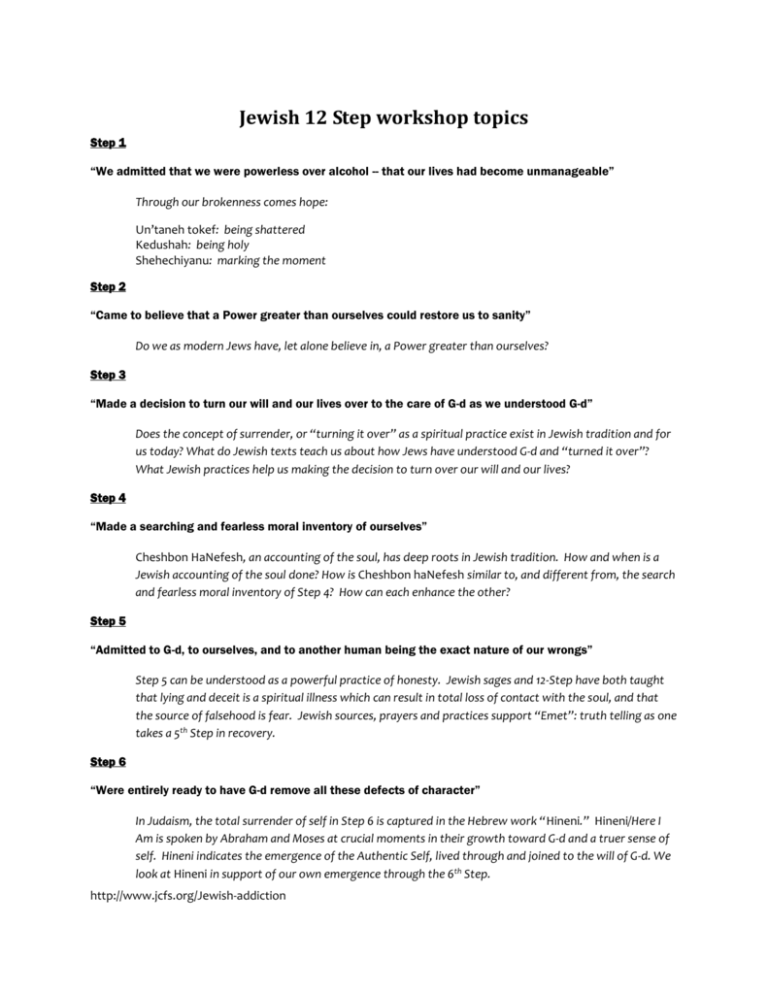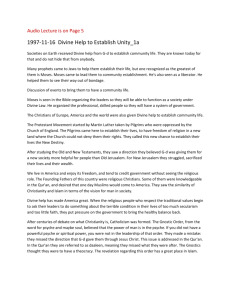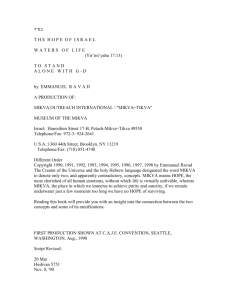Jewish 12 Step workshop topics
advertisement

Jewish 12 Step workshop topics Step 1 “We admitted that we were powerless over alcohol -- that our lives had become unmanageable” Through our brokenness comes hope: Un’taneh tokef: being shattered Kedushah: being holy Shehechiyanu: marking the moment Step 2 “Came to believe that a Power greater than ourselves could restore us to sanity” Do we as modern Jews have, let alone believe in, a Power greater than ourselves? Step 3 “Made a decision to turn our will and our lives over to the care of G-d as we understood G-d” Does the concept of surrender, or “turning it over” as a spiritual practice exist in Jewish tradition and for us today? What do Jewish texts teach us about how Jews have understood G-d and “turned it over”? What Jewish practices help us making the decision to turn over our will and our lives? Step 4 “Made a searching and fearless moral inventory of ourselves” Cheshbon HaNefesh, an accounting of the soul, has deep roots in Jewish tradition. How and when is a Jewish accounting of the soul done? How is Cheshbon haNefesh similar to, and different from, the search and fearless moral inventory of Step 4? How can each enhance the other? Step 5 “Admitted to G-d, to ourselves, and to another human being the exact nature of our wrongs” Step 5 can be understood as a powerful practice of honesty. Jewish sages and 12-Step have both taught that lying and deceit is a spiritual illness which can result in total loss of contact with the soul, and that the source of falsehood is fear. Jewish sources, prayers and practices support “Emet”: truth telling as one takes a 5th Step in recovery. Step 6 “Were entirely ready to have G-d remove all these defects of character” In Judaism, the total surrender of self in Step 6 is captured in the Hebrew work “Hineni.” Hineni/Here I Am is spoken by Abraham and Moses at crucial moments in their growth toward G-d and a truer sense of self. Hineni indicates the emergence of the Authentic Self, lived through and joined to the will of G-d. We look at Hineni in support of our own emergence through the 6th Step. http://www.jcfs.org/Jewish-addiction Step 7 “Humbly asked G-d to remove our shortcomings” What does Judaism say about what we can expect of G-d when we ask (or “petition”) G-d for something? A great deal has been written about petitionary prayer, and rightly so…the question of how (or if) G-d answers prayerful request is a fundamental concern to one’s spiritual life. We study Torah texts involving petitionary prayer, Jewish thought and experience on this crucial topic, and how Jewish prayer practices can support our 7th Step experience in recovery. Step 8 “Made a list of all persons we had harmed, and became willing to make amends to them all.” Step 8 teaches that a state of willingness must precede Step 9, the actual making of amends. What can we learn from Jewish thought, practice and prayer about the process of becoming willing to do tshuvah? We examine Elul practices such as reciting Psalm 27 and sounding the shofar that may help us “become willing.” Step 9 “Made direct amends to such people wherever possible, except when to do so would injure them or others.” How does one know if making an amend would injure another, in which case a direct amend should not be made? Great Jewish teachers have given us specific guidance as to when complete honesty is required and when one must take a more discrete approach. We explore the Jewish understanding of truth-telling when making amends. Step 10 “Continued to take personal inventory and when we were wrong promptly admitted it.” The Jewish practice of Mussar offers a simple, elegant structure for observing and modifying one’s “spiritual curriculum.” Personal middot/traits that are out of balance are identified and specific steps are taken each day to bring middot to center. Doing so removes obstructions to the Divine Light inside each of us. We learn what Mussar teaches about these middot and what to do each day to enhance our ongoing personal inventory. Step 11 “Sought through prayer and meditation to improve our conscious contact with G-d, as we understood G-d, praying only for knowledge of G-d’s will for us and the power to carry that out.” Many Jews in recovery do not have a daily Jewish spiritual practice. For some, working a 12-Step program is their first experience of prayer, meditation and the continuous striving to be in relationship to the Source of All. We learn Jewish prayer and meditation practices that may enhance our 11th Step work. http://www.jcfs.org/Jewish-addiction Step 12 “Having had a spiritual awakening as the result of these Steps, we tried to carry this message to others, and to practice these principles in all our affairs.” Being a blessing, becoming a mensch http://www.jcfs.org/Jewish-addiction


![September 13, 2015 Sermon 1st night Rosh[...]](http://s3.studylib.net/store/data/006863751_1-791ae0c3db233f228e8fd60834a01a65-300x300.png)


![September 22, 2015 Sermon Kol Nidrei Th[...]](http://s3.studylib.net/store/data/006883231_1-c85e16857411579da31e913d72d9dc6b-300x300.png)


